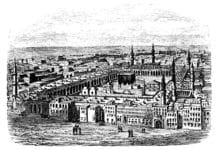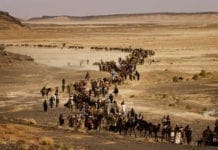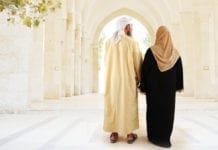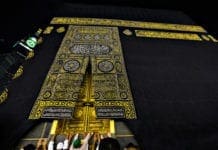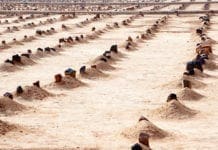Preparations
When Islam was well-established in the hearts of the Muslims, Allah decided that the time had come for His Messenger and his community to enter Makkah. They would purify the Ka’bah so that it would be a blessed place of guidance for the whole world. They would restore Makkah to its previous status and the sacred city would offer security for all people once again.
A broken treaty
In the Peace Treaty of Hudaybiyyah it was laid down that anyone who wanted to enter into a treaty and alliance with the Messenger of Allah should be able to do so; and anyone who wanted to enter into a treaty and alliance with the Quraysh should also be allowed to do so. The Banu Bakr entered into an alliance with the Quraysh while the Banu Khuza’ah entered into one with the Messenger of Allah.
 Longstanding hostility existed between the Banu Bakr and Banu Khuza’ah. The coming of Islam had put a barrier between the people as they had become engrossed in its affairs. The Peace Treaty enabled the Banu Bakr to settle an old score against the Banu Khuza’ah. One night the Banu Bakr attacked the Banu Khuza’ah by night when they were camped by a spring and killed some of their men. A skirmish developed and the Quraysh helped the Banu Bakr by providing weapons.
Longstanding hostility existed between the Banu Bakr and Banu Khuza’ah. The coming of Islam had put a barrier between the people as they had become engrossed in its affairs. The Peace Treaty enabled the Banu Bakr to settle an old score against the Banu Khuza’ah. One night the Banu Bakr attacked the Banu Khuza’ah by night when they were camped by a spring and killed some of their men. A skirmish developed and the Quraysh helped the Banu Bakr by providing weapons.
Some Quraysh leaders also fought with the Banu Bakr secretly at night, and the Khuza’ah were driven into the Haram. Some of the Quraysh said, ‘We have entered the Haram. Mind your gods!’ Others replied thoughtlessly, ‘There is no god today, men of Banu Bakr. Take your revenge! You may never have another chance!’
Seeking help
‘Amr ibn Salim al-Khuza’i went to the Messenger of Allah in Madinah and recited some verses to him about the alliance between the Muslims and the Khuza’ah. He asked for help, saying that the Quraysh had violated the agreement. His tribe had been attacked at night, he maintained, and men had been killed in ruku’ and sajdah, while performing prayers.
The Messenger of Allah assured him, ‘You will be helped, ‘Amr ibn Salim!’ He then sent a man to Makkah to get confirmation of the attack and to offer the Quraysh the chance to redress their offence. Their reply was impulsive and they ignored the Likely consequences.
The Quraysh attempt to renew the treaty
When the Messenger of Allah heard their answer, he said, ‘I think you will see Abu Sufyan coming to strengthen the treaty and to ask for more time.’
 That happened. The Quraysh were so concerned about what they had done that they charged Abu Sufyan with the task of getting the treaty ratified.
That happened. The Quraysh were so concerned about what they had done that they charged Abu Sufyan with the task of getting the treaty ratified.
Abu Sufyan came to the Messenger of Allah in Madinah and also went to visit his daughter, Umm Habibah, the wife of the Prophet. However, when he went to sit on the Messenger of Allah’s carpet, she rolled it up from under him.
Puzzled, he said to her, ‘My daughter, I do not know whether you think the carpet is too good for me or whether I am too good for the carpet.’
She replied, ‘This is the Messenger of Allah’s carpet and you are an unclean idol worshipper. I do not want you to sit on his carpet.’
‘By Allah,’ Abu Sufyan retorted. ‘You have been spoiled since you left me.’
Abu Sufyan fails
Abu Sufyan went to the Messenger of Allah, but he did not receive any answer. Then he went to Abu Bakr and asked him to speak to the Messenger of Allah for him but he refused. He tried to win over ‘Umar, ‘Ali and Fatimah but they all said that the matter was too serious for them to get involved. Abu Sufyan became confused about what to do.
Making ready
The Messenger of Allah asked the Muslims to start preparing for an expedition but he asked them to keep it a secret. Later he announced that he was going to Makkah and ordered them to get ready.
He said, ‘O Allah! Impede the informers of the Quraysh so that we can take Makkah by surprise.’ He left Madinah with ten thousand men in Ramadan 8 A.H. and advanced as far as Marr az-Zahran where they set up camp. Allah concealed this information from the Quraysh, so they waited in uncertainty.
A pardoning
On the way, the Messenger of Allah happened to meet his cousin, Abu Sufyan ibn al-Harith ibn ‘Abdu’l-Muttalib. He ignored him because he had suffered insults and persecution from Abu Sufyan. The cousin complained to ‘Ali that he had been ignored. ‘Ali said to him, ‘Go to the Messenger of Allah and say to him what the brothers said to Yusuf, “By Allah, Allah has preferred you to us and we were indeed sinful.” (Surah Yusuf, 12: 91) The Messenger of Allah never likes anyone to show more mercy than he.’
what the brothers said to Yusuf, “By Allah, Allah has preferred you to us and we were indeed sinful.” (Surah Yusuf, 12: 91) The Messenger of Allah never likes anyone to show more mercy than he.’
Abu Sufyan ibn al-Harith did as ‘Ali advised and the Messenger of Allah replied, ‘Have no fear this day. Allah will forgive you. He is the Most merciful of the merciful.’
Abu Sufyan ibn al-Harith accepted Islam and was known for his piety. He did not raise his head ever again in front of the Messenger of Allah because he felt so ashamed of his past behaviour.
Abu Sufyan ibn Harb accepts Islam
The Messenger of Allah was commanding the army and he ordered the campfires to be lit. Abu Sufyan ibn Harb, who was spying out the ground for the Quraysh, said: ‘I have never seen so many fires or such an army.’
Al-‘Abbas ibn ‘Abdu’l-Muttalib had already left Makkah with his wife and children as a Muslim Muhajir and had joined the Muslim army. He recognized Abu Sufyan’s voice and called to him, ‘See, the Messenger of Allah is here with his army. What a terrible morning the Quraysh will have!’
He made Abu Sufyan ride on the back of his mule, fearing that if a Muslim saw him, he would kill him. Al-‘Abbas took him to the Messenger of Allah who said, ‘Woe to you, Abu Sufyan! Has not the time come for you to acknowledge that there is no god but Allah?’
Abu Sufyan replied, ‘How kind and gentle you are! By Allah, I think that if there had been another god besides Allah, he would have helped me today.’
‘Woe to you, Abu Sufyan! Is it not time that you recognized that I am the Messenger of Allah?’
Abu Sufyan replied, ‘May my father and mother be your ransom! How kind and generous you are! But by Allah, I still have some doubt as to that.’
Al-‘Abbas intervened, ‘Woe to you, Abu Sufyan! Become a Muslim and testify that there is no god but Allah and that Muhammad is the Messenger of Allah before you lose your head.’ Then Abu Sufyan recited the articles of faith and became a Muslim.
The amnesty
 The Messenger of Allah was generous in granting amnesty to everyone so that no one in Makkah need be killed that morning. Only those who courted danger ran any risk of losing their life. He declared, ‘Whoever enters the house of Abu Sufyan is safe. Whoever locks his door is safe. Whoever enters the mosque is safe.’ The Messenger of Allah told his army not to use arms against anyone when they entered Makkah unless they met opposition or resistance. He directed the army not to touch property or possessions belonging to the people of Makkah and nothing should be destroyed.
The Messenger of Allah was generous in granting amnesty to everyone so that no one in Makkah need be killed that morning. Only those who courted danger ran any risk of losing their life. He declared, ‘Whoever enters the house of Abu Sufyan is safe. Whoever locks his door is safe. Whoever enters the mosque is safe.’ The Messenger of Allah told his army not to use arms against anyone when they entered Makkah unless they met opposition or resistance. He directed the army not to touch property or possessions belonging to the people of Makkah and nothing should be destroyed.
Abu Sufyan’s influence
The Messenger of Allah decided to demonstrate the power of Islam to Abu Sufyan. He asked ‘Abbas ibn ‘Abdu’l-Muttalib to take Abu Sufyan to w here the marching squadrons would pass by.
The Muslim squadrons passed by like a surging sea with the different tribes bearing their standards. Whenever a tribe passed by, Abu Sufyan would ask ‘Abbas about it and, when he heard the name of the tribe, he would mumble gloomily, ‘What have I got to do with them?’ Finally the Messenger of Allah passed by with his squadron in full, gleaming green armour. It was the regiment of the Muhajirun and the Ansar. Only their eyes were visible because of their armour.
Abu Sufyan said, ‘Glory be to Allah! ‘Abbas, who are these?’
‘This is the Messenger of Allah with the Muhajirun and Ansar,’ he answered.
‘No one has any power or resistance against them,’ said Abu Sufyan. ‘By Allah, Abu’ l-Fadl, the authority of your brother’s son has certainly increased.’
‘Abu Sufyan,’ ‘Abbas said, ‘This is not a kingdom, it is prophethood.’
Abu Sufyan replied, ‘Then it is wonderful.’
He stood up and shouted at the top of his voice, O men of the Quraysh! This is Muhammad with a force you cannot resist. He has ten thousand men of steel. He says that whoever enters my house will be safe.’
The men shouted back, ‘Allah slay you! What good is your house to us?’
Abu Sufyan added, ‘And whoever locks himself indoors is safe and whoever enters the mosque is safe.’ So the people dispersed and went into their homes or into the mosque.
A humble victory
On the morning of Friday, 20 Ramadan, 8 A.H., the Messenger of Allah entered Makkah with his head bowed. When he realized the honour of the conquest Allah had bestowed upon him, he felt so humble before Allah that his chin almost touched the back of his camel. He was reciting Surat al-Fath as he rode into Makkah in victory. He raised the standard of justice, equality, and humility. Behind him rode Usamah ibn Zayd, the son of his freed slave, rather than any sons of the Banu Hashim or of the Quraysh leaders, even though they were present.
One man, trembling with awe on the Day of the Conquest, was told, ‘Be at ease. Do not be afraid. I am not a king. I am only the son of a woman of the Quraysh who used to eat meat dried in the sun.’
(Continued)



